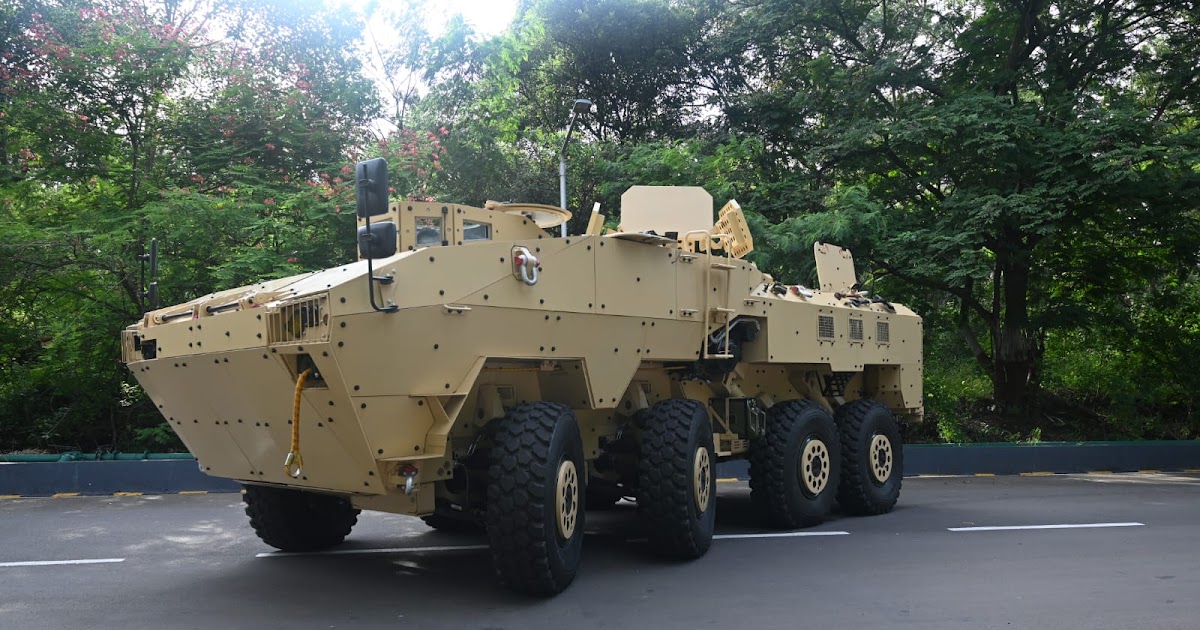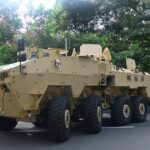
Tata Advanced Systems’ first expansion abroad as a defence OEM (above: the WhaP 8×8)
By Vikas Gupta
Defence News of India, 1st Oct 24
Tata Advanced Systems Limited (TASL) announced on Monday a strategic agreement with Morocco’s Royal Armed Forces for locally assembling wheeled armoured platforms (WhaP 8×8) in its defence manufacturing unit in Casablanca, Morocco.
The WhaP 8×8 has been developed by the Defence Research and Development Organisation (DRDO) in collaboration with TASL.
WhaP 8×8 is a wheeled, amphibious, lightly armoured vehicle. Besides its primary role as a troop carrier, itsmultiple variants include mobile command posts, reconnaissance vehicles for the chemical, biological, radiological and nuclear (CBRN) battlefield; amphibious reconnaissance, or as an armoured ambulance.
“This will be Morocco’s first large defence manufacturing plant and the first defence manufacturing plant established outside India by an Indian defence original equipment manufacturer (OEM),” a TASL spokesperson said.
Given its size, protection, versatility and affordability, the WhaP 8×8 is expected to be snapped up by African militaries.
“This contract is of significant size and of strategic importance for us. This not only enables TASL to help initiate Morocco’s defence ecosystem but also acts as a launch point for TASL into rest of Africa for select defence systems,” said TASL’s CEO, Sukaran Singh.
“TASL’s local unit will produce a significant number of the specialised vehicle systems for Morocco and potentially for other countries in Africa,” Singh said.
While the initial contracted quantity is entirely to meet the needs of Royal Moroccan Army, this facility will be a 100 per cent subsidiary of TASL and become an export hub to meet the requirements of other countries, especially in Africa.
The collaboration between DRDO and TASL for WhaP 8×8 makes the armoured vehicle a successful example of partnership within the Indian private sector, as well as between the private and public sectors.
Senior government officials pointed out that this contract hews closely with Prime Minister Narendra Modi’s strategy of developing close relations with African nations, which are feeling their weapons supply lines from Russia squeezed; and an unwelcome aggressiveness from new suppliers like China and Turkey.
TASL was created by merging the defence verticals in several Tata group companies, including Tata Motors and Tata Power (Strategic Engineering Division).
Production facility
The WhaP 8×8 production facility in Morocco is expected to become operational over the next 12 months to deliver the contracted number of units.
A significant amount of the platform will be exported from India, which is required to meet commitments for local employment, value addition and support in Morocco. A production facility in Casablanca covering 20,000 square metres has been identified.
WhaP’s operational capabilities
Depending upon the variant, the WhaP 8×8 weighs 20-27 tonnes. Variants below 24.5 tonnes can be amphibious, i.e. capable of floating, to cross a river or a lake.
The WhaP 8×8 crew members enjoy modular protection with bolt-on, retrofittable panels that provide protection from small arms bullets. The floor can be reinforced to resist a blast from an improvised explosive device (IED).
Its primary armament is a 30 mm cannon, which is mounted on a gun turret with an upgraded sighting system. The gun turret is being developed by the DRDO in partnership with Bharat Electronics Ltd (BEL).
The WhaP 8×8 incorporates state-of-the-art technologies such as a high power, integrated power pack with automatic transmission and modularity and scalability that can be easily customised to cater to various missions and operating conditions of Morocco’s Royal Armed Forces.
“Tata Advanced Systems will work closely with the government of Morocco to develop a robust ecosystem which would include engaging with the local supply chain partners and vendors, training and skill development of the workforce and building related capabilities, and to maintain the systems in-country. Further, the facility will adopt global standards in line with international best practices,” the TASL spokesperson said.





